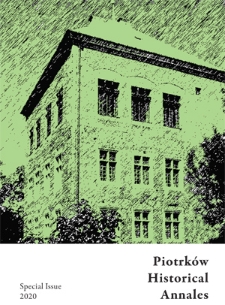Biblioteka Cyfrowa Uniwersytetu Jana Kochanowskiego udostępnia 13 367 obiektów cyfrowych
Obiekt
Tytuł: Areas of Education and Care for Children and Youth of the Catholic Church in the Kingdom of Poland and the Borderlands of the Russian Partition in the Early 20th
Twórca:
Tytuł odmienny:
Tytuł publikacji grupowej:
Piotrkowskie Zeszyty Historyczne
Abstrakt:
The article focuses on the role of the Catholic Church in organizing education and care for the young generation in the conditions of laissez-faire policy of the partitioner. The clergy's activity in the field of education, care and upbringing implemented the assumptions of the social teaching of the Church. Its foundations were formulated in the encyclicals of Leo XIII. In the Kingdom of Poland, they did not initiate a deepened theological and axiological debate, but for some of the clergy became a determinant of practical activities. Assistance and upbringing activities in the Kingdom of Poland and the Borderlands of the Russian Partition for children and youth included for example: ochronkas, orphanages, occupational classrooms, artisanal enterprises and educational facilities, as well as resocialisation institutions. This activity was particularly noticeable in secret habitless congregations, founded by Capuchin Father Honorat Koźmiński. Diocesan clergy played an important role in the development of Polish education, including work of the Polish Educational Society (Polska Macierz Szkolna) and other educational initiatives.
Miejsce wydania:
Opis fizyczny:
ISSN:
Wydawca:
Wydawnictwo Uniwersytetu Jana Kochanowskiego. Filia w Piotrkowie Trybunalskim
Data wydania:
Identyfikator:
oai:bibliotekacyfrowa.ujk.edu.pl:3759 doi:10.25951/4218
Język:
Jest częścią:
Piotrkowskie Zeszyty Historyczne
Ma część:
Typ:
Prawa dostępu:
Licencja:
Format:
Kolekcje, do których przypisany jest obiekt:
- Biblioteka Cyfrowa Uniwersytetu Jana Kochanowskiego > Wydawnictwo Uniwersyteckie > Wydawnictwa ciągłe
- Biblioteka Cyfrowa Uniwersytetu Jana Kochanowskiego > Wydawnictwo Uniwersyteckie > Wydawnictwa ciągłe > „Piotrkowskie Zeszyty Historyczne"
Data ostatniej modyfikacji:
7 sie 2024
Data dodania obiektu:
21 gru 2020
Liczba wyświetleń treści obiektu:
219
Liczba wyświetleń treści obiektu w formacie PDF
313
Wszystkie dostępne wersje tego obiektu:
https://bibliotekacyfrowa.ujk.edu.pl/publication/4218
Wyświetl opis w formacie RDF:
Wyświetl opis w formacie OAI-PMH:
Obiekty Podobne
Bołdyrew, Aneta Krakowiak, Małgorzata
Bołdyrew, Aneta

